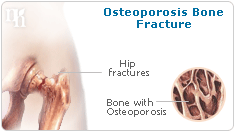
Estrogen hormones are a common treatment for women looking to alleviate the symptoms of menopause. Women also turn to estrogen hormones therapy to combat certain diseases that may arise in aging women as a result of natural estrogen loss. Besides estrogen hormones, many women turn to other medications as they age. A common treatment for postmenopausal women is loop diuretics. To determine whether loop diuretics also contributed to bone mineral density loss, falls and fractures among postmenopausal women, this survey was conducted.
Just before and after menopause, the threat of osteoporosis and heart failure presents a serious health concern for women. Data shows that half of the women who have experienced menopause will, at one point in their life, have an osteoporosis - related fracture.
As this is a large scale concern in the health field, numerous examinations are ongoing to determine preventative methods and to test if existing medications or treatments actually exemplify or increase the risks of osteoporosis and fracture in women.
In the United States alone, loop diuretics were included in the top 200 prescribed medications. Loop diuretics elevate the quantity of calcium excreted in the body. Hypercaliuria (elevated calcium excretion in urine) is related to low bone mineral density which is a definite risk factor for fractures.

In prior studies, association between loop diuretics and bone mineral density, falls and fractures have been uncertain.
Using data from the Women's Health Initiative a study was performed in women ages 50 to 79 enrolled in 40 different clinical centers, from October 29, 1993 to December 31, 1998. The patients were studied for loop diuretic use and changes in bone mineral density, falls and fractures. Of the 133,855 participants, 3,411 were loop diuretic users and 130,444 were nonusers.
Covariates
Certain adjustments were made for this study including medication use and use of dietary supplement use. Hormone therapy was defined as estrogen hormones with or without progesterone.
Questionnaires were used to collect data on age, ethnicity, parental history of hip fractures, fractures before or after the age of 55, age at menopause, smoking status, and history of coronary heart disease or coronary heart failure. Participants were also asked about history of diabetes, stroke, cancer and emphysema.
The conclusions of this Women's Health Initiative survey failed to reveal any significant associations between the use of loop diuretics and fractures, falls and changes in bone mineral density in post hormonal women and estrogen hormones users. Long term loop diuretic use however was associated with higher risk of fracture. It was also noticed that the majority of loop diuretic users were in poor health and already at a higher risk for bone mineral density loss, falls and fractures than nonusers.